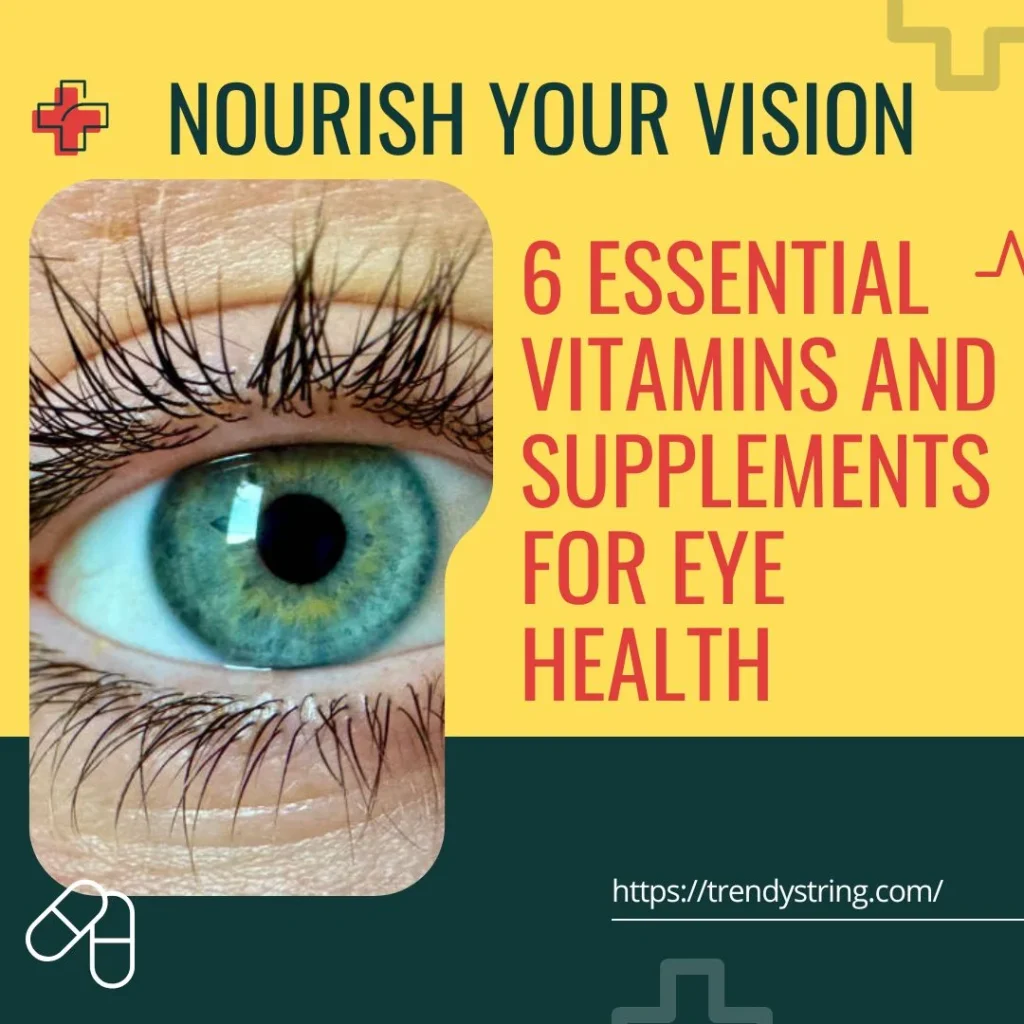
Maintaining optimal eye health is crucial for a vibrant life. A balanced diet rich in essential nutrients plays a pivotal role in supporting your vision. While a healthy lifestyle and regular eye exams are essential, specific vitamins and supplements can further enhance your eye health.
Read More interesting articles on trendystring.com
Key Nutrients for Eye Health
Vitamin A:
- Why it’s important: Vitamin A is essential for maintaining healthy vision, especially in low-light conditions. It helps produce rhodopsin, a pigment crucial for night vision.
- Food sources: Carrots, sweet potatoes, spinach, kale, and fortified dairy products.
- Supplement considerations: Consult your doctor before taking vitamin A supplements, as excessive intake can lead to toxicity.
Vitamin C:
- Why it’s important: As a powerful antioxidant, vitamin C helps protect your eyes from oxidative stress, which can contribute to age-related macular degeneration (AMD).
- Food sources: Citrus fruits, berries, bell peppers, and leafy green vegetables.
- Supplement considerations: While vitamin C supplements are generally safe, excessive intake may lead to digestive issues.
Omega-3 Fatty Acids:
- Why it’s important: Omega-3 fatty acids, particularly DHA and EPA, are vital for maintaining healthy cell membranes, including those in the retina. They can help reduce inflammation and protect against dry eye syndrome.
- Food sources: Fatty fish (salmon, mackerel, herring), flaxseed, chia seeds, and walnuts.
- Supplement considerations: Consult your doctor before taking omega-3 supplements, especially if you have bleeding disorders.
Vitamin E:
- Why it’s important: Another powerful antioxidant, vitamin E helps protect cells from oxidative damage, reducing the risk of age-related eye diseases.
- Food sources: Nuts, seeds, vegetable oils, and leafy green vegetables.
- Supplement considerations: While vitamin E supplements are generally safe, excessive intake may increase the risk of bleeding.
Zinc:
- Why it’s important: Zinc plays a crucial role in various eye functions, including the synthesis of visual pigments and the protection of the retina.
- Food sources: Meat, poultry, seafood, legumes, nuts, and seeds.
- Supplement considerations: Excessive zinc intake can interfere with copper absorption, so it’s best to consult your doctor before taking supplements.
Lutein and Zeaxanthin:
- Why they’re important: These carotenoids act as natural sunscreens for your eyes, filtering harmful blue light and protecting the retina from oxidative damage.
- Food sources: Leafy green vegetables (spinach, kale), egg yolks, and certain fruits.
- Supplement considerations: Lutein and zeaxanthin supplements are generally safe, but it’s always best to consult your doctor.
Tips for Optimal Eye Health
In addition to a nutrient-rich diet and supplements, consider these tips to protect your vision:
- Regular Eye Exams: Schedule regular eye exams to detect and address potential eye problems early.
- Protect Your Eyes from UV Rays: Wear sunglasses with UV protection and a wide brimmed hat when outdoors.
- Practice the 20-20-20 Rule: Take a 20-second break every 20 minutes to focus on something 20 feet away to reduce eye strain.
- Maintain a Healthy Lifestyle: Prioritize sleep, manage stress, and avoid smoking to promote overall eye health.
Remember: While supplements can be beneficial, they should not replace a balanced diet. Always consult your healthcare provider before starting any new supplement regimen.